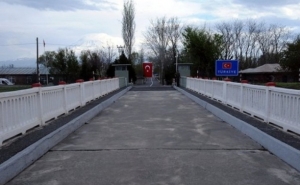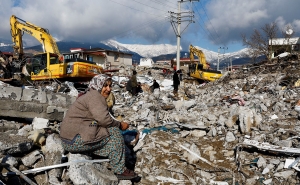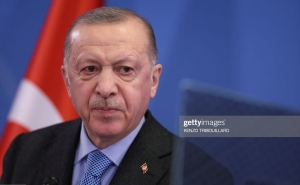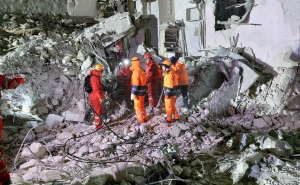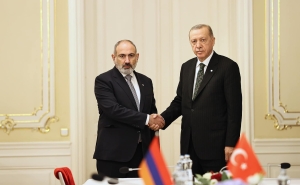 Turkish Conspiracy against Neighboring Iraq and Syria
Turkish Conspiracy against Neighboring Iraq and Syria

On February 28, the representatives of the Turkish ruling Justice and Development Party (AKP) and the pro-Kurdish Peoples' Democratic Party (HDP) met to discuss the details of the so-called roadmap for the settlement of the Kurdish problem in Turkey. According to the information disseminated in the media, the sides managed to agree on the 10 articles of the roadmap, which was suggested to the Turkish government by the leader of the outlawed Kurdistan Workers’ Party (PKK), Abdullah Öcalan. In the roadmap certain points are defined, constitutional changes included, that are to ensure the basic human rights of Kurds in Turkey
The present stage of negotiations between the Turkish government and the PKK started two-years ago, in March, 2013. At that time still Prime Minister of Turkey, Recep Tayyip Erdogan, declared in live TV interview that he entrusted the Turkish National Intelligence agency to start negotiations with imprisoned Öcalan. The announcement was unprecedented as previously the Turkish government had avoided any open contacts with isolated leader of PKK.
The Erdogan's call was reciprocated by Öcalan, who called the followers of PKK to give up armed struggle against the Turkish government. From that time on, a kind of "resolution process" started between the AKP and PKK; the process in which Öcalan is a chief negotiator from the Kurdish side accompanied by members of the pro-Kurdish People's Democracy Party (HDP). It is interesting to note that HDP is going to participate in the upcoming general elections in June and is said to have a potential to pass 10 percent threshold in the election; the scenario, which will give the Kurds an opportunity for the first time to form a fraction in the Turkish Parliament.
Although the negotiation process is ongoing, the willingness of the Turkish government to recognize Öcalan as a chief negotiator and the continuing negotiations between them still raise a number of questions that need to be answered. The major question can be formulated in the following way: what made the Turkish government to embark on negotiating the peace plan with the PKK, only in 2013, when the similar plan was proposed by PKK also in 2009, but received no attention from the Turkish ruling party?
This article will try to answer this question by referring not only to the possible internal motives of the ruling AKP party but also to the changing role of the Kurds in the region at the face of recent development connected with the activities of Islamic State terrorist group.
When referring to internal motives of the the ruling AKP party to start negotiations with PKK, the critics of Erdogan as well as the proponents of PKK mention the chain of election in the country, local elections on March 30, 2014, presidential election on August 10, 2014 and finally general election on June 7, 2015 as the main reason of the Erdogan’s "seeming" willingness to resolve the Kurdish problem. In this context it is not by chance that second powerful member in PKK after Öcalan, Cemil Bayik, on the occasion accused Erdogan of "foot-dragging" and trying to gain time until 2015 June election, Al-monitor reports.
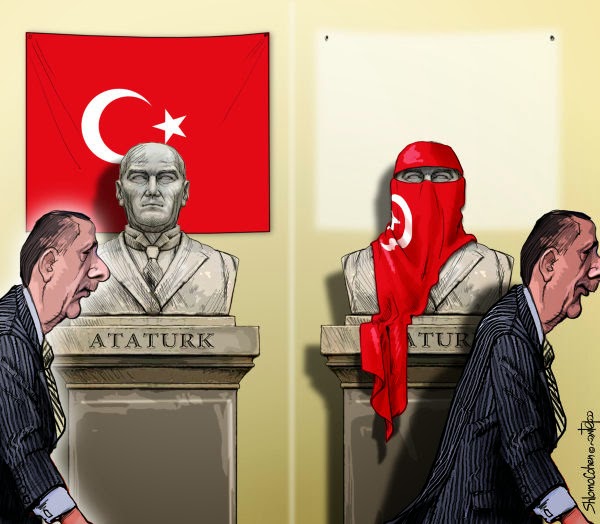
This is the reason why the proponent of PKK strive to achieve concrete results before June 2015 elections, such as adopted laws that will acknowledge Kurdish national rights , Öcalan’s release from prison, amendments in Constitution that will provide more guarantees to Kurds and the like; changes that the ruling AKP party seems not to be prone to initiate yet. Such kind of passive behavior of the Turkish government makes the PKK representatives suspect the sincereness of the Erdogan’s initiative on the eve of general elections in June.
On the occasion the top commander of the Kurdish forces in Turkey, Murat Karayilan, hinted at the intention of Öcalan to participate in June election, in case the Turkish government released him from prison by that time. However his speech also did not sound so positive in which he particularly noted: "If they [AKP] are sincere they must take steps. If they delay this approach, that will mean war. It will mean they will fight us after the election. They again want to eradicate us and solve the issue with war,"- Al-monitor reports.
Although hardly anyone can completely exclude the assumption according to which the present willingness of the ruling party to negotiate with the Kurds derives from its desire to win the Kurdish electorate in the June election, it should be noted that this initiative contains number of risks for AKP. Firstly the government’s decision to negotiate with Öcalan was not unilaterally agreed by the population in Turkey. The article of Stiftung Wissenschaft und Politik refers to the recent survey in Istanbul according to which only forth of the population was for the negotiation, while the rest opposed it; the fact which means Erdogan risks losing the votes of this particular section of population. Besides, at present there are developing secular tendencies among the former Kurdish religious population, which was a potential electorate for AKP. In addition the Kurdish-Islamic parties formed in Turkey tend to become potential competitors for AKP during elections. Thus in order to completely explain the motive of ruling AKP party to negotiate with the PKK, only the factor of upcoming elections would not suffice, as long as, notwithstanding the opportunities, it also contains a number of risks .
The picture becomes more interesting if one goes beyond internal motives of Kurdish-Turkish reconciliation process and tries to view the issue in larger regional context: developments in Syria and Iraq, the activities of Islamic State terrorism organization as well as increasing role of the Kurds in the region.
At first glance it may seem that we witness a kind of contradictory developments in Syria and Iraq. Unlike the relationship of the Turkish government with the Kurds in northern part of Syria, the relationship with the Kurds in Iraq seems to be cordial enough. For example several months ago Iraq’s Kurdistan Regional Government (KRG) signed 50-year agreement with Turkey to export oil; the agreement which caused a conflict with Baghdad over oil rights in Iraq. In addition, Turkey has a role of a major importer and an investor in the Kurdistan region of Iraq.
On the contrary, the relations between the Kurdish Democratic Union Party in Syria (PYD) and the Turkish government are strained, as Turkey opposes any kind of autonomy for the Kurds in northern parts of Syria. The explanation is that the PYD is affiliated with PKK in Turkey; the factor that makes the Turkish government fear that any possible autonomy of the Kurds in northern Syria will cause similar aspirations among the Kurds in Turkey.
Thus if we try to bring together all the facts we have: cordial relation between KRG and AKP, on the contrary, strained relations between PYD and AKP on the one hand and present "resolution process" between AKP and PKK on the other hand, what will be the conclusion that one can derive?
One possible conclusion is that the Turkish government has finally recognized that it cannot ignore present increasing role of the Kurds in the region, in the face of their successful battles against IS. Accordingly, the representatives of the ruling AKP party, continuing to be loyal to their "stick and carrot" strategy towards the Kurds, decided for certain period to abandon strategy of "stick" to please the Kurds in the region and prevent their possible unison against Turkish Republic - the unison, the negative effects of which will be more painful on the eve of upcoming elections. While in the long-time perspective Turkey may aim at strengthening its grip on the Kurds not only in Turkey but also in neighboring Syria and Iraq, in case of which Turkey can simultaneously fulfill two goals: first prevent the establishment of independent Kurdish republic in the region, second by increasing its influence on the Kurds in neighboring Iraq and Syria, establish its long-time desired federal state that will include northern parts of Syria and Iraq, mostly populated by the Kurds. From this perspective already existing economic relations between the Kurds in Iraq and Turkey seem not to be a random coincidence.
Other materials on this subject
- ''The Olive Branch'': Ankara Will Not Reconsider its Policy against the Kurds due to International Community's Concerns Due to the developments in Afrin, many Italian political figures have opposed Erdoğan's visit today. The leader of the Left Party of Italy, Nicola Fratognani, urged the authorities of the country ''not...
- Kurds in Syria Call on US Support to Rein in Turkish Operations Turkish President Recep Tayyip Erdogan has said the operation will be expanded to other areas, including Manbij, where American forces are stationed with Kurdish militia.
- Karen Karapetyan Meets with Iraqi Kurdistan Prime Minister Nechirvan Barzani The parties discussed possibilities and prospects for strengthening and developing bilateral economic ties. Prime Minister Barzani assured of their willingness to deepen cooperation with Armenia and boost...
- Two Turkish Soldiers Killed in Kurdish Attack in Southeast Another soldier was wounded in the attack which took place as the troops were carrying out security operations.
- Will the US Suspend Military Assistance to the Syrian Kurds? So, if in reality, the US is not going to suspend the military assistance to the Kurds, what is the disseminated news conditioned by?
-
 17:08
17:08The regular session of the Anti-corruption Policy Council takes place in Jermuk
-
 15:05
15:05The Prime Minister sends congratulatory messages to the supreme leader of Iran and the President of Iran
-
 11:11
11:11Armenia sends earthquake aid to Turkey
-
 10:43
10:43Commemoration of the Pontiff St. Sahak Partev
-
 09:16
09:16Some roads are closed and difficult to pass in Armenia
-
 19:55
19:55Phone conversation of the Foreign Minister of Armenia with the U.S. Assistant Secretary of State for European and Eurasian Affairs
-
 18:30
18:30Prime Minister Pashinyan and President Khachaturyan meet
-
 18:20
18:20Ararat Mirzoyan with Co-Chairman of the OSCE Minsk Group of France Brice Roquefeuil
-
 17:01
17:01Humans could land on Mars within 10 years, Musk predicts
-
 16:45
16:45France, US urge 'immediate' end to Nagorno Karabakh blockade
-
 16:01
16:01Blockaded Nagorno Karabakh launches fundraiser to support quake-hit Syria
-
 15:59
15:59Earthquake death toll in Turkey rises to 18,342
-
 15:43
15:43Ararat Mirzoyan Held a Telephone Conversation with Sergey Lavrov
-
 15:06
15:06French president rules out fighter jet supplies to Ukraine in near future
-
 14:47
14:475 Day Weather Forecast in Armenia
-
 14:44
14:44President Vahagn Khachaturyan wrote a note in the book of condolences opened in the Embassy of Syria in Armenia
-
 14:20
14:20Azerbaijan’s provocations impede establishment of peace and stability – Armenian FM tells Russian Co-Chair of OSCE MG
-
 12:57
12:57France representation to OSCE: Paris calls on Azerbaijan to restore freedom of movement through Lachin corridor
-
 11:40
11:40Command of Kosovo forces highly appreciated preparation of Armenian peacekeepers
-
 10:16
10:16The United States withdrew from sanctions against Syria for six months the provision of assistance after the earthquake
day
week
month
Humidity: %
Wind: km/h


